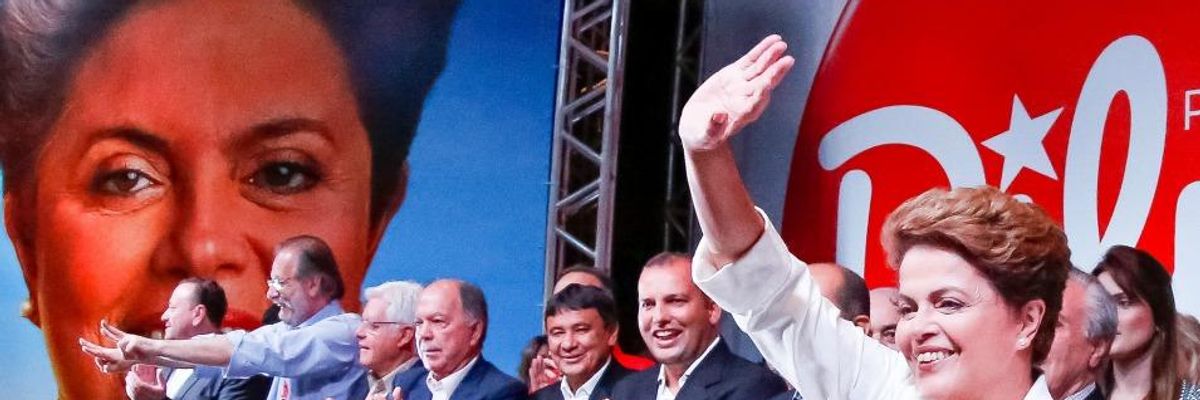

SUBSCRIBE TO OUR FREE NEWSLETTER
Daily news & progressive opinion—funded by the people, not the corporations—delivered straight to your inbox.
5
#000000
#FFFFFF
To donate by check, phone, or other method, see our More Ways to Give page.


Daily news & progressive opinion—funded by the people, not the corporations—delivered straight to your inbox.

Brazil's President Dilma Rousseff waves to supporters on Sunday following election results. (Photo: Ichiro Guerra/flickr/cc)
Brazil's President Dilma Rousseff was re-elected in a narrow victory on Sunday.
Beating opponent Aecio Neves of the Social Democrat party by a slim 51.6 percent to 48.3 percent, Rousseff's win continues a dozen years of rule by the Workers Party.
Speaking to supporters in Brasilia following the election results, Rousseff said, "I want to be a much better president than I have been up to now."
"We're going to continue building a better Brazil, a more inclusive, more modern, more productive Brazil. A country of solidarity and opportunities," she said.
Reuters reports that her "victory, however narrow, is a blow for conservatives in the region."
Noting that "we are more than a decade and a half into Latin America's 'left turn,' Greg Grandin writes at The Nation, "It's not hard to understand why: economics."
On the left's economic gains in Brazil, Center for Economic and Policy Research Co-Director Mark Weisbrot stated, "The Workers Party governments have delivered on clear economic and social gains since they first came to power in 2003, and voters apparently want those gains to continue."
"Poverty has been greatly reduced; 31.5 million Brazilians were lifted out of poverty as poverty has been lowered by over 55 percent and extreme poverty by 65 percent. Inequality has decreased while the minimum wage has been nearly doubled and social spending has consistently increased," Weisbrot continued.
Trump and Musk are on an unconstitutional rampage, aiming for virtually every corner of the federal government. These two right-wing billionaires are targeting nurses, scientists, teachers, daycare providers, judges, veterans, air traffic controllers, and nuclear safety inspectors. No one is safe. The food stamps program, Social Security, Medicare, and Medicaid are next. It’s an unprecedented disaster and a five-alarm fire, but there will be a reckoning. The people did not vote for this. The American people do not want this dystopian hellscape that hides behind claims of “efficiency.” Still, in reality, it is all a giveaway to corporate interests and the libertarian dreams of far-right oligarchs like Musk. Common Dreams is playing a vital role by reporting day and night on this orgy of corruption and greed, as well as what everyday people can do to organize and fight back. As a people-powered nonprofit news outlet, we cover issues the corporate media never will, but we can only continue with our readers’ support. |
Brazil's President Dilma Rousseff was re-elected in a narrow victory on Sunday.
Beating opponent Aecio Neves of the Social Democrat party by a slim 51.6 percent to 48.3 percent, Rousseff's win continues a dozen years of rule by the Workers Party.
Speaking to supporters in Brasilia following the election results, Rousseff said, "I want to be a much better president than I have been up to now."
"We're going to continue building a better Brazil, a more inclusive, more modern, more productive Brazil. A country of solidarity and opportunities," she said.
Reuters reports that her "victory, however narrow, is a blow for conservatives in the region."
Noting that "we are more than a decade and a half into Latin America's 'left turn,' Greg Grandin writes at The Nation, "It's not hard to understand why: economics."
On the left's economic gains in Brazil, Center for Economic and Policy Research Co-Director Mark Weisbrot stated, "The Workers Party governments have delivered on clear economic and social gains since they first came to power in 2003, and voters apparently want those gains to continue."
"Poverty has been greatly reduced; 31.5 million Brazilians were lifted out of poverty as poverty has been lowered by over 55 percent and extreme poverty by 65 percent. Inequality has decreased while the minimum wage has been nearly doubled and social spending has consistently increased," Weisbrot continued.
Brazil's President Dilma Rousseff was re-elected in a narrow victory on Sunday.
Beating opponent Aecio Neves of the Social Democrat party by a slim 51.6 percent to 48.3 percent, Rousseff's win continues a dozen years of rule by the Workers Party.
Speaking to supporters in Brasilia following the election results, Rousseff said, "I want to be a much better president than I have been up to now."
"We're going to continue building a better Brazil, a more inclusive, more modern, more productive Brazil. A country of solidarity and opportunities," she said.
Reuters reports that her "victory, however narrow, is a blow for conservatives in the region."
Noting that "we are more than a decade and a half into Latin America's 'left turn,' Greg Grandin writes at The Nation, "It's not hard to understand why: economics."
On the left's economic gains in Brazil, Center for Economic and Policy Research Co-Director Mark Weisbrot stated, "The Workers Party governments have delivered on clear economic and social gains since they first came to power in 2003, and voters apparently want those gains to continue."
"Poverty has been greatly reduced; 31.5 million Brazilians were lifted out of poverty as poverty has been lowered by over 55 percent and extreme poverty by 65 percent. Inequality has decreased while the minimum wage has been nearly doubled and social spending has consistently increased," Weisbrot continued.